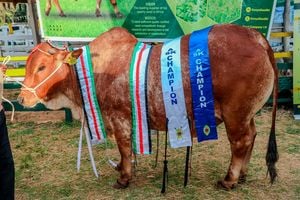
A camel caravan in Garbatulla in Isiolo County.
I have spent this week in Naivasha on invitation as a livestock expert. I was also to be part of a project creation.
The goal of the project is to enhance livestock production and trade in selected countries in the Sahel.
The Naivasha meeting aimed at working out the project’s component to enhance the development of pastoral markets in Kenya.
Attendants comprised policy makers, livestock production and marketing administrators, livestock product traders, pastoral livestock producers among others.
One core group of attendants was seasoned and accomplished livestock producers and animal and livestock product traders from arid and semi-arid lands (Asal) counties of Baringo, Mandera, Wajir, Garissa and Isiolo. They are also all men and women elders in their communities.
I noted that two of the men ventured into livestock production and trade after retiring as senior chiefs.
Some of the traders dealt with animal export and import from Ethiopia, Kenya and Somalia.
There were also livestock and livestock product traders from other parts of the country who deal with livestock from the project counties.
I was happy to meet one of my clients from Mombasa who runs a beef feedlot and exports cattle, sheep and goats after fattening them to the required standard.
The Asal counties deal with four types of livestock – cattle, sheep, goats and camels.
Camels are mainly reared by farmers of Somali extraction. However, due to market demand, hardiness of the animal in harsh climate and improved prices, camels are now increasingly being reared by other communities including Borana, Maasai and Tugen.
According to unanimous reports from the core group participants, camels are now being increasingly reared in Isiolo, Baringo, Kajiado and other Asal counties that traditionally had few of these animals. Isiolo has become a key market for camels.
There was much more to learn from the core group of elders, especially for the participants who are not familiar with livestock trade in Mandera, Wajir, Garissa, Baringo and Isiolo.
Two women elders from Garissa and Wajir informed the participants that it is difficult for women to enter and thrive in the livestock and livestock product business.
There are many cultural barriers for women in the business.
The community believes livestock business is for men. However, the push for gender equality and inclusion in the country’s economic activities, coupled with legal requirements have encouraged bold women to venture into the livestock and livestock product business.
Aisha* and Halima* explained the challenges they encountered on their entry into the livestock business. To start with, they were not accepted by men though they did not encounter physical or abusive resentment.
At the beginning, men and women discouraged them form getting into the trade by saying it was work for men. Men at the market would avoid mixing or staying close to them.
A majority of customers would refuse to buy animals from the women. Aisha and Halima fought the challenge by going to the market at dawn to sell to early buyers.
They would then leave the market when there were many men traders. The pair also found a corner of the market that was a bit isolated from male traders. That guaranteed them the buyers who did not mind buying from women traders.
They also found that male buyers and sellers of livestock distrusted them because women had no history of handling livestock cash.
The women traders found they would be sold animals at higher prices at the market and homesteads.
They, therefore, made less margins than their male colleagues. Another challenge the women had was the long distance they would sometime have to travel to obtain animals.
The area is insecure and sometimes animals had to be walked over several days.
Sometimes they needed to get animals from Somalia, a country that has had security challenges for decades.
Aisha and Halima told the meeting that they are grateful to God for giving them the courage to persevere and surmount the challenges.
They are now accomplished livestock and livestock product traders, who cherish mentoring other women.
Men have also become more tolerant to women in the animal business. However, more still needs to be done to educate men on gender equality in all spheres of life, especially economic activities, the two women said.
The elders’ group updated participants on the cattle movement for trade in Mandera, Wajir, Garissa, Isiolo and Baringo counties.
Somalia is known for its export of sheep, goats and camels to the Middle East. Ironically, the country does not have an equally high population of sheep, goats and camels.
The elders explained that the animals come from Kenya, Ethiopia and Somalia.
Ethiopian cattle are sold in Mandera, Kenya, mainly because they fetch better prices than where they come from.
Kenyan traders then sell some of the animals to Somali traders who then sell to exporters in Somalia.
Some animals from Ethiopia and Somalia are sold to businesspeople in Mandera, Marsabit, Wajir, Baringo and Isiolo.
From the counties, the animals are then sold to traders or livestock produces in any part of the country. A majority of cattle being sold to be moved into the hinterland of Kenya are traded in Isiolo and Garissa.
All the elders said insecurity, poor roads or lack of roads, low water and feed availability are the major challenges facing livestock and livestock product trade in their counties.
They said improved road infrastructure would reduce insecurity and enhance livestock production and trade.









